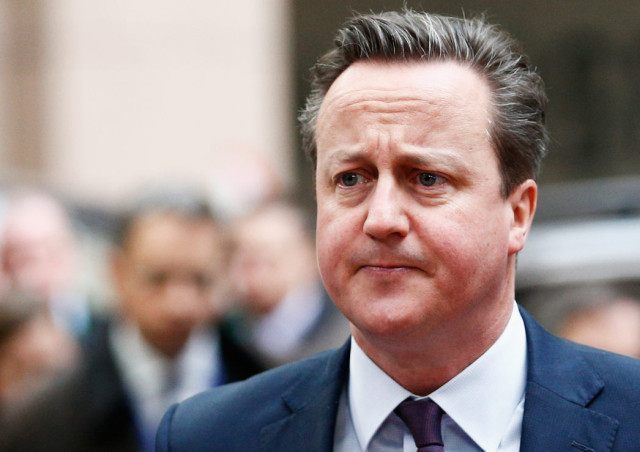Suggestions by the Prime Minister David Cameron that Britain leaving the European Union could cause price rises in British shops have been slammed as ‘preposterous, shrill and panicky’. Mr Cameron has also claimed that leaving the EU will hurt British trade – despite receiving clear advice to the contrary from business leaders a month ago.
In the latest instalment of Project Fear, Mr Cameron warned that Brits could be paying more for mortgages, food, and even gloves and socks if we dared to leave the EU.
Addressing car workers at a Vauxhall factory in Ellesmere Port on Thursday, Mr Cameron said: “Before we joined, we faced extremely high tariffs: 14 per cent on cars, 17 per cent on bicycles, 32 per cent on salt, 37 per cent on china. Even, oddly, 20 per cent on gloves – but only 14 per cent on socks.
“Today, there is one tariff in the Single Market: Zero per cent.”
And he fell back on the argument that leaving the EU could cost up to three million jobs in a bid to take the moral high ground. In what’s being seen as a thinly-veiled attack on rival Boris Johnson, Mr Cameron said “For those who advocate leaving, lost jobs and a dented economy might be collateral damage or a price worth paying.
“For me, they’re not. They never are because there’s nothing more important than protecting people’s financial security. That’s why I believe we are better off in.”
In fact, the claim that jobs would be lost was roundly debunked exactly a year ago today, in a report by the highly respected Institute of Economic Affairs. The report also debunked the idea that tariffs would be imposed by the EU, pointing out that, even if a free trade deal was not struck, “both parties would be bound by the WTO’s ‘most favoured nation’ tariffs paid by other developed countries, which would prevent the imposition of punitive tariffs by the EU.”
Ryan Bourne, Head of Public Policy at the IEA, said at the time: “It’s high time that politicians and commentators stopped scaremongering… The public deserve a rational and informed debate.”
Last week Mr Johnson, who favours leaving the EU and who is seen as a contender to replace Mr Cameron as leader of the Conservative Party, said that a Brexit “might or might not” cost jobs. However, during an interview with the BBC he added “Actually, there are plenty of people who now think the cost of getting out would be virtually nil and the cost of staying in would be very high.”
Analysis by the think tank Open Europe has found that the impact of a Brexit is likely to be fairly minor, ranging from a potential 0.8 percent fall in GDP to a possible gain of 0.6 percent by 2030.
This renders a further claim by Mr Cameron that mortgage rates would rise as a result of instability in the pound caused Brexit fairly baffling. Mortgage rates are typically linked to the Bank of England’s lending rate, and most economists believe that would remain low or even fall further during a period of uncertainty to minimise potential economic shocks.
Consequently, one cabinet minister has described Mr Cameron’s remarks as “preposterous, shrill and panicky.”
Conservative MP Adam Afriyie agreed, saying that far from securing jobs, Brussels was a “destroyer of jobs.”
He added: “We would have more jobs in Britain if we left the EU. We would be more competitive and be able to set up trade deals with countries where we currently can’t.”
Commons leader Chris Grayling has also spoken out, calling Mr Cameron’s threats “simply not true.”
He argued that the price of Brussels’ regulation and erosion of sovereignty far outweighed any gains to be made from remaining within the single market, saying: “If we vote to stay in the EU, we are voting to be substantially and increasingly governed from Brussels.
“It would be a vote for an unreformed EU which will hoover up more money and more power at every opportunity it gets. A vote to remain is a vote to leave the EU court and unelected EU judges in control of a whole raft of our laws.”
And he warned that the EU was on a “journey” towards further integration that Britain would do well to avoid.
“In the early days all member states had a veto over new laws. So we had plenty of opportunities to protect our national interest,” he said.
“But the EU today has moved a long way away from those roots. Treaty after treaty scrapped those vetoes and made an increasing proportion of new EU legislation subject to qualified majority voting, leaving us unable to stop things that we did not agree with.”
In fact, by continuing to insist that leaving the EU would damage British trade, the Prime Minister is going against the advice of business leaders, who insist that, to the contrary, membership of the EU is harming British trade.
In February 80 business and community leaders wrote to the Prime Minister to tell him just that, writing: “As long as Britain’s trade policy is controlled by the EU, we cannot sign bilateral free trade agreements with Pakistan, India, Bangladesh, Australia, New Zealand or for that matter any other non-EU state.
“Vested interests on the continent sustain a relatively protectionist policy. We have to apply the EU’s common external tariff to exports from Commonwealth countries – hurting consumers here as well as producers there.”

COMMENTS
Please let us know if you're having issues with commenting.